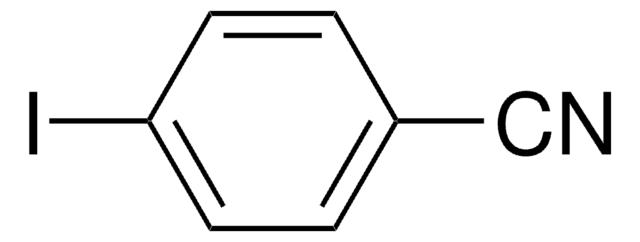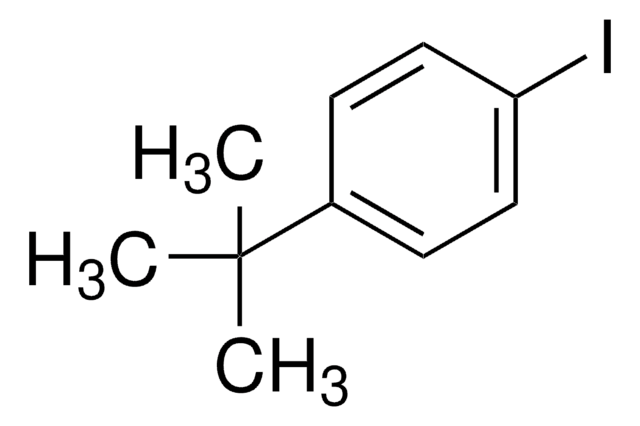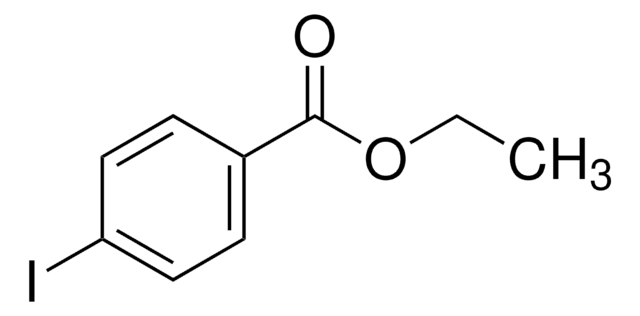All Photos(3)
About This Item
Linear Formula:
IC6H4COCH3
CAS Number:
Molecular Weight:
246.05
EC Number:
MDL number:
UNSPSC Code:
12352100
PubChem Substance ID:
NACRES:
NA.22
Recommended Products
Assay
≥97%
mp
82-84 °C (lit.)
functional group
iodo
ketone
SMILES string
CC(C1=CC=C(I)C=C1)=O
InChI
1S/C8H7IO/c1-6(10)7-2-4-8(9)5-3-7/h2-5H,1H3
InChI key
JZJWCDQGIPQBAO-UHFFFAOYSA-N
General description
Pd(0)-catalyzed cross coupling reaction of 4′-iodoacetophenone with siloxane has been reported. Heck-Mizoroki reactions of 4′-iodoacetophenone with styrene catalyzed by Pd nanoparticles in the flow reactor has been reported.
Application
4′-Iodoacetophenone may be used as substrate for the palladium-catalyzed coupling reactions. It may be used in the synthesis of quinoline-based potential anticancer agents.
Storage Class Code
11 - Combustible Solids
WGK
WGK 3
Flash Point(F)
Not applicable
Flash Point(C)
Not applicable
Personal Protective Equipment
dust mask type N95 (US), Eyeshields, Gloves
Choose from one of the most recent versions:
Certificates of Analysis (COA)
Lot/Batch Number
Don't see the Right Version?
If you require a particular version, you can look up a specific certificate by the Lot or Batch number.
Already Own This Product?
Find documentation for the products that you have recently purchased in the Document Library.
Customers Also Viewed
Klaas Mennecke et al.
Beilstein journal of organic chemistry, 5, 21-21 (2009-07-11)
The preparation of monolithic polyionic supports which serve as efficient heterogeneous supports for palladium(0) nanoparticles is described. These functionalized polymers were incorporated inside a flow reactor and employed in Suzuki-Miyaura and Heck cross couplings under continuous flow conditions.
S E Denmark et al.
Organic letters, 3(11), 1749-1752 (2001-06-19)
A sequential ring-closing metathesis/silicon-assisted cross-coupling sequence has been developed. Alkenyldimethylsilyl ethers of omega-unsaturated alcohols undergo facile ring closure with Schrock's catalyst to afford five-, six-, and seven-membered cycloalkenylsiloxanes bearing substituents on both alkenyl carbons. These siloxanes were highly effective coupling
G J Atwell et al.
Journal of medicinal chemistry, 32(2), 396-401 (1989-02-01)
A series of phenyl-substituted derivatives of the "minimal" DNA-intercalating agent N-[2-(dimethylamino)-ethyl]-2-phenylquinoline-8-carboxamide (1) have been synthesized and evaluated for in vivo antitumor activity, in a continuing search for active compounds of this class with the lowest possible DNA association constants. Substitution
Chemistry Letters (Jpn), 2049-2049 (1989)
Our team of scientists has experience in all areas of research including Life Science, Material Science, Chemical Synthesis, Chromatography, Analytical and many others.
Contact Technical Service














